Successful link-building, and SEO in general, involves lots of experimentation. But learning through trial and error takes time. And often lots of money.
In the article, you will learn how to avoid 18 common link building mistakes.
Let's dive right in!
Key takeaways:
- Avoid link-building shortcuts. Buying links from link farms, using PBNs or low-quality directories, or spamming forums never brings the desired long-term results.
- Individual metrics like DA/DR give you only a snapshot of website performance. For a complete picture, pay attention to relevance, traffic, backlink diversity, and outbound links.
- There are no silver bullets in SEO. Use different link-building tactics to build links to various pages across your site for a robust and natural backlink profile.
- Exploit opportunities, like unlinked brand mentions, to secure quick wins and look after your backlinks to prevent them from rotting.
- Value quality over quantity. But don't get obsessed about landing the perfect links.
- Build relationships with bloggers and website owners in your niche. Automated cold emails without personalization don't cut it anymore.
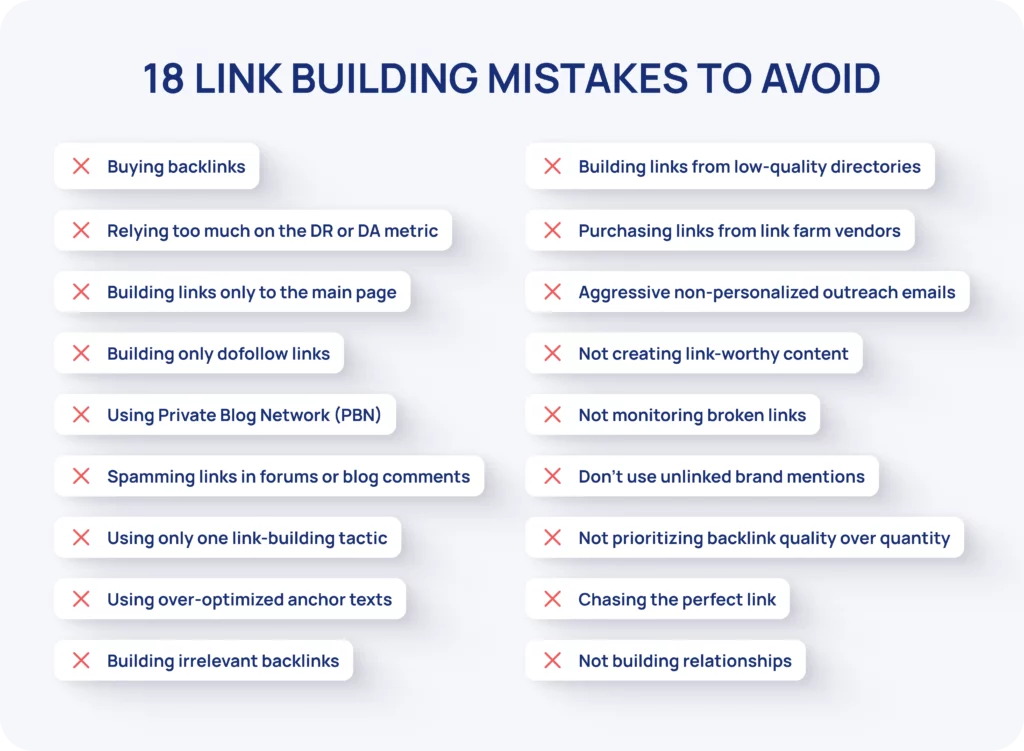
Mistake #1: Buying Backlinks
Fiverr is full of offers from freelance link builders promising you to deliver dozens of backlinks for next to nothing. This is tempting. Building links in-house requires hours of prospecting, research and outreach, the results are never guaranteed.
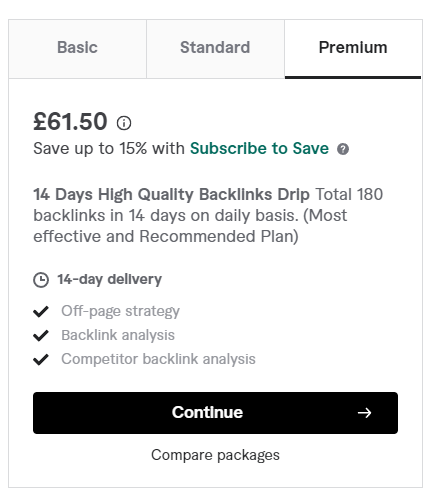
No wonder that SEOs decide to go this way. 92% of respondents who took part in our recent study into the state of link-building believe their competitors buy links.
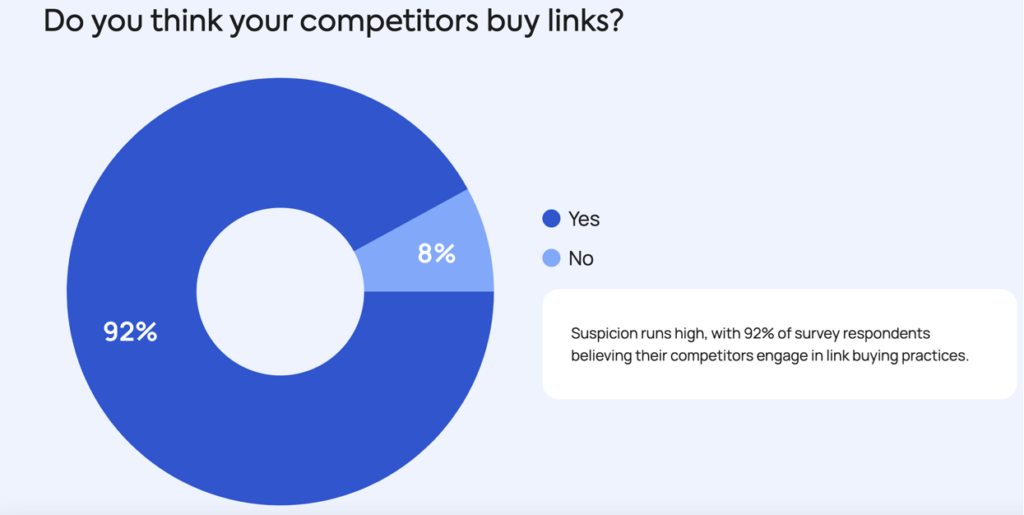
But here's the catch:
Google considers offering money or other benefits for links as a violation of its guidelines because it aims to manipulate rankings.

This can give your site a short-term boost, but it won't last. In most cases, Google simply dismisses such links, so they bring no benefits whatsoever. This means you waste whatever you've paid for them.
In more extreme cases, bad links can result in a manual penalty and a demoting of your content in SERPs. Undoing the damage requires a lot of effort, which could have been spent building links using white-hat tactics in the first place. Totally not worth it!
Here's an alternative:
Instead of buying links from dodgy vendors, team up with a reputable agency like Editorial.Link. We'll analyze your link profile and develop a comprehensive link-building strategy tailored to your goals and budget.
Mistake #2: Relying Too Much on the DR or DA Metric
Domain Rating or Domain Authority gives you a quick idea of how valuable a link could be for your link-building efforts. However, relying on it exclusively to assess links is a major mistake.
Let me explain:
First, DR/DA are calculated based on the number of inbound links. This means you can easily manipulate it by buying links. Just like I did a few months back to get a website with no valuable content to DR70.
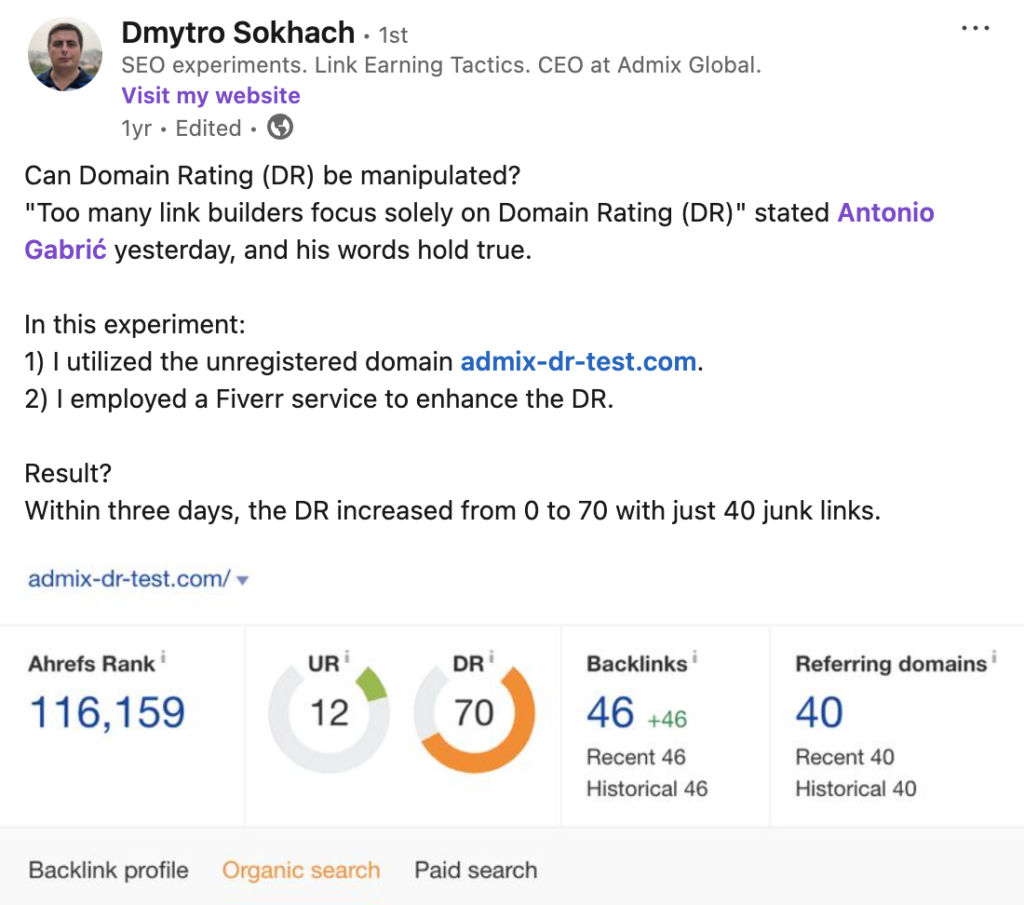
Second, how much link juice a site pumps depends on its outbound links. The more sites they link to, the less the link benefits yours.
Finally, link building isn't just about improved rankings but also about referral traffic. So you want to team up with sites that have an established audience and can send lots of visitors your way.
Moreover, lack of traffic to a website with high DR is a red flag that the page is involved in black-hat practices. If your site has no visitors, how do they end up linking to it?
Check out the startup.info if you want to see what I mean: DR76 and the estimated monthly traffic only 20. Crazy!

To truly assess the value of a link, consider other factors:
- Organic traffic
- Topic and audience relevance
- Inbound/outbound Link Ratio
- Link placement
- Backlink diversity
- Link stability
- Link acquisition history
In the past, I would give priority to the domain rating or domain authority, overlooking other elements like topic or audience relevance, link placement, diversity, and performance, e.g., link stability and link history. Now I know, these elements combined with the website traffic are more important than authority.
Mistake #3: Building Links Only to the Main Page
Building links exclusively to your homepage is a mistake for a couple of reasons.
First, it isn't natural. It may make your site look suspicious and can be seen as an attempt to manipulate rankings.
Moreover, building links to the homepage is often more challenging than other pages, like your blog posts. You can easily slot a reference to your piece of content into an article that covers a similar topic. Inserting a brand name is a bigger ask.
And the best part:
If your internal link structure is sound, links to other pages will still help your homepage or landing pages rank.
So, instead of focusing all your link-building efforts on your home page, promote also your:
- Landing pages for different product features and use cases.
- BOFU articles (e.g., Tool X vs Tool Y).
- Product category pages in e-commerce
- Case studies
Heck, there's nothing wrong with promoting your 'About us' or 'Contact us' pages.
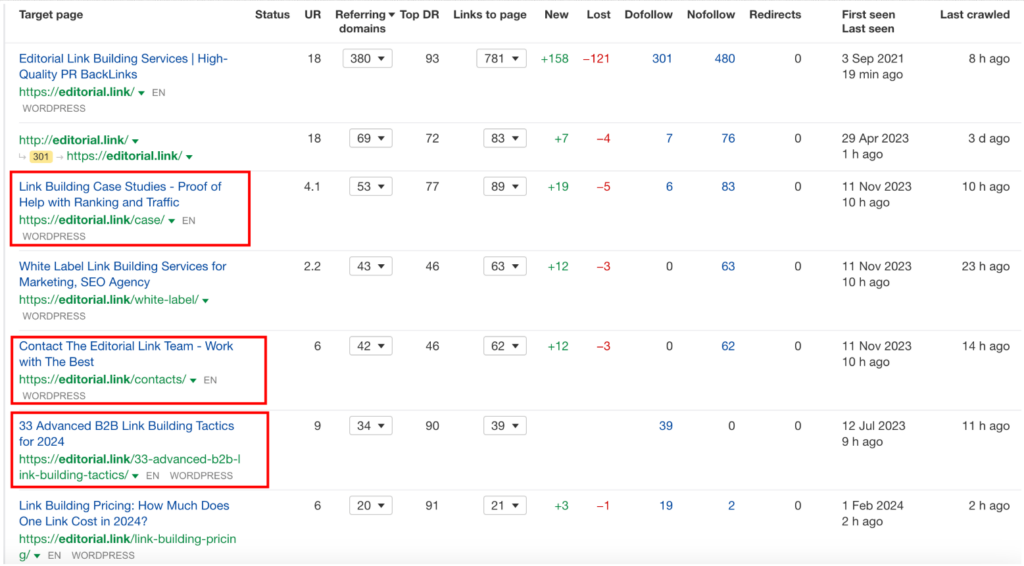
Mistake #4: Building Only Dofollow Links
Over half of the SEO experts we interviewed for our State of Link Building report don't make an effort to acquire nofollow backlinks. This is consistent with the general sentiment that nofollow links are less valuable than dofollow ones.
This goes back to the times when Google didn't consider links with the rel nofollow attribute for its rankings. This has changed, though. Since 2019, Google has treated such links as hints on how to understand links only. It doesn't ignore them completely because they can help it interpret the content they point at.
There's also evidence that nofollow links might help pages improve their ranking. For example, an experiment conducted by Chris Panteli and Kyle Roof showed that a link from a page with high traffic can enhance SERP performance.
Nofollow links aren’t as insignificant as they seem. They potentially impact rankings and contribute to a robust SEO strategy.
James Brockbank of Digitalsoft shares the view. From his experience, nofollow backlinks from 'trusted sources' like media publications still pass link equity:
I’ve said for a LONG time that we’ve seen plenty of evidence through our digital PR work at Digitaloft that nofollow links from press publications (in other words, from pages that get traffic from the site’s popularity or reader base) have a positive impact on rankings.
If a link comes from an authoritative press publication, there’s plenty of signals to indicate a nofollow link should pass PageRank.
Nofollow links from media websites or any other website with a large following have one more advantage: they can bring lots of referral traffic and increase your brand visibility. So, even if they don't improve your website's ranking in SERPs, they still offer substantial business benefits.
Finally, no-follow backlinks make your backlink profile natural.
Mistake #5: Using Private Blog Network (PBN)
Private Blog Networks, or PBNs, are networks of websites built with one purpose in mind: enhancing search engine rankings by linking to the main website that the owner promotes.
As you might suspect, this is a black-hat link-building tactic because the network is maintained to manipulate the search results.
Don't go this way! The links are of poor quality, and Google is better and better at identifying such schemes.
Mistake #6: Spamming Links in Forums or Blog Comments
Getting links by posting in forums and commenting on blog posts (or paying someone to do it for you) may be a way to get hundreds of backlinks with relatively little effort.
But that's the point: the less effort it takes, the more people do it, and the lower return on your investment.
Easy links are tempting but deliver nothing. Real results come from earning the right links, however long it takes. There are no shortcuts in SEO. I learned the hard way to avoid sacrificing quality for quantity.
Such backlinks come with the rel=UGC attribute, so they're treated by Google just like nofollow links.
The difference? User-generated content doesn't normally carry the same weight as articles from high-quality sites. Anyone can post anything on a forum.
Consequently, the SEO benefits are limited.
Having said that, Reddit content has featured heavily in SERPs, so posting there can increase your brand visibility and even bring customers, but I wouldn't make it my No. 1 strategy.
Mistake #7: Using Only One Link-Building Tactic
If you find a link-building tactic that works well, it may be tempting to use it for all your link-building needs.
This, however, comes with risks.
Using only one tactic helps you build only one type of link, which looks unnatural. Websites don't have links that come exclusively from guest posts or listicles.
And what if the search engine algorithms change, and suddenly, a particular link type, for example, from directories, stops pumping the link juice as it used to? Your rankings will tank. It's a bit gamble.
What's more, overreliance on one link-building tactic leads to missed opportunities. For example, PR campaigns can get your content in front of thousands of people while appearing in podcasts and interviews is a chance to establish yourself as a thought leader in your field.
I realized that having a mix of backlink types is essential for a strong SEO strategy. We started incorporating social media mentions, directory listings, and partnerships with industry influencers—boosting our site’s authority and rankings. Diversifying our link sources not only strengthened our strategy but also helped us reach a wider audience.
Mistake #8: Using Over-Optimized Anchor Texts
Well-optimized anchor texts improve user experience, provide context about the linked page, and consequently, improve your website visibility and SERP performance.
What does well-optimized mean?
In short, it needs to truly reflect the page's content and ideally include the keywords you want to rank for.
But here's the kicker:
Stuffing your text with keyword-rich anchor texts that don't fit naturally into the content can bite you back.
Search engines may see this as an attempt to manipulate search results and can slap you with manual action.
To avoid it, try not to use the exact match anchor text more than once in the text. Instead, use a range of different anchor texts, like:
- Branded terms (Editorial.Link)
- Generic anchor texts (Contact us, Book the demo)
- Partial match keywords (see the example below)
- Combinations of the above (e.g.) Get in touch with the Editorial.Link team, Ahrefs backlink checker)
Mistake #9: Building Irrelevant Backlinks
The recent Google API leak confirmed what many SEOs had known for a long time: Your links need to be relevant to move the needle.
Relevant doesn't necessarily mean from the same niche as long as your audiences overlap.
For example, a website designer and a content marketer share the same target audience, so a link exchange between their websites would be perfect. But a link from a local shop they helped advertise their business might not anymore.
In some cases, a link from an authoritative website, like a news outlet, can also help your rankings, even if it's not in the same niche. However, the page and the anchor text still need to be relevant.
What happens if the link is irrelevant?
Most of the time, nothing, as Olexandra Dubakova, the CMO at Freetour, experienced first-hand:
At the time, we didn’t have regard for link relevancy; all we wanted was links and more links. We wasted time getting links from random sites, some of which had nothing related to tourism, not knowing Google wouldn’t credit our site for them
In some instances, irrelevant links can cause serious damage by misleading the search engines, who might assume your content is about something else.
Mistake #10: Building Links from Low-Quality Directories
Directory link-building offers potentially high rewards. It's usually quick to list your businesses, and the listing can boost your brand visibility. And pump some link juice. Local SEO relies on directories a lot.
However, as with many tactics, it can get spammy if you overdo it or use poor-quality directories, like those from Fiverr.
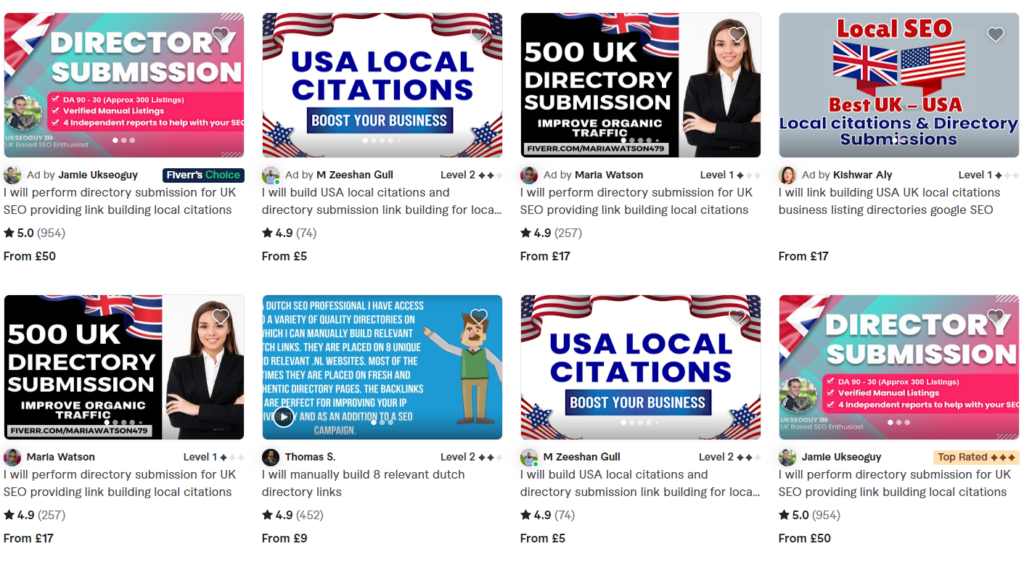
You can avoid this by asking yourself 5 questions before you list your business:
- Does the directory look reputable?
- Is it relevant to your niche? G2 or Clutch is relevant for SaaS products but not for automotive goods.
- Does it list legit businesses?
- Does it reject applicants? If there's no candidate vetting process, you may end up in poor company.
- Do you recognize the name? Look for well-known directories, like Yelp or Yellow Pages.
Mistake #11: Purchasing Links from Link Farm Vendors
Link farms are websites whose main reason for existence is selling links.
The telltale signs you're dealing with a link farm include:
- Lack of quality content
- An unnaturally high number of external links
- Links to pages across very diverse niches, including dodgy ones like gambling or adult content
- Poor website design
- Low DA/DR
Between the summer of 2023 and the spring of 2024, we analyzed over 44k domains listed in link-selling databases. The result? Nearly 13k of them were no longer available after a year. Moreover, at the end of the period, only 6.6k sites with 1000+ traffic were left.
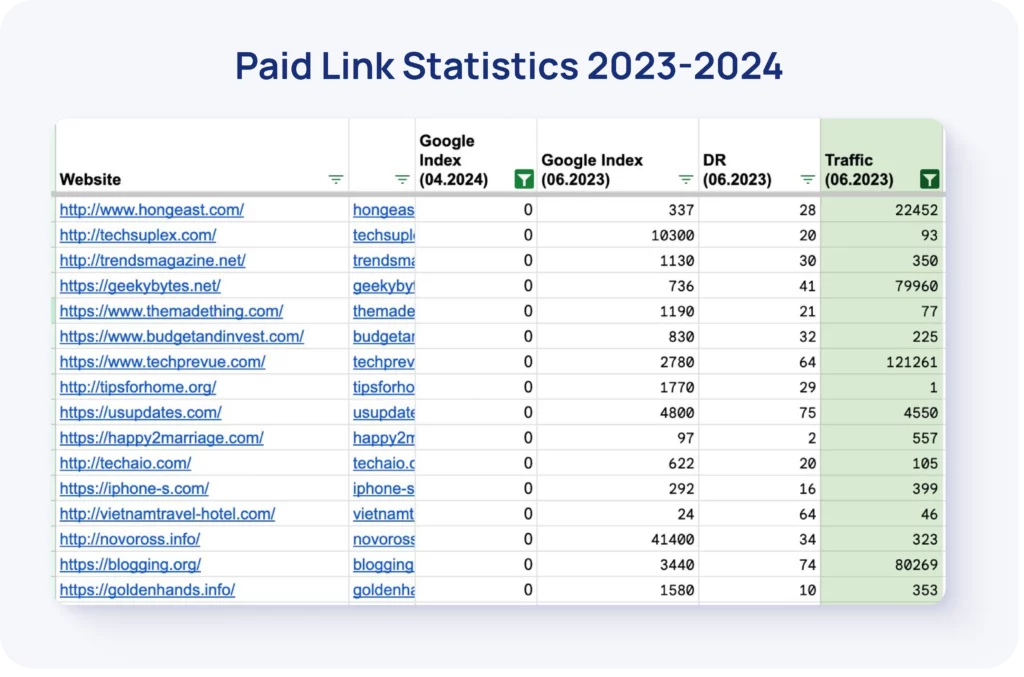
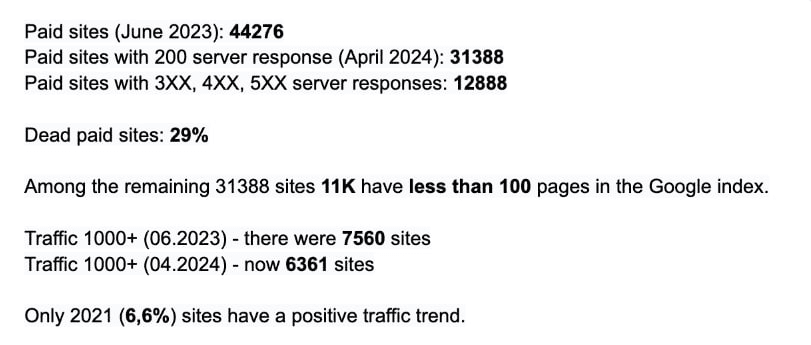
This means that if you buy links from such sites, there's a 30% chance that it will disappear within a year, and you aren't likely to get much referral traffic from them.
However, as with other schemes designed to play the system, the consequences can be more severe than just lost money or time.
Mistake #12: Aggressive Non-personalized Outreach Emails
Spam folder. That's where most of the generic outreach emails sent to me end up. Email providers' algorithms are merciless for them.
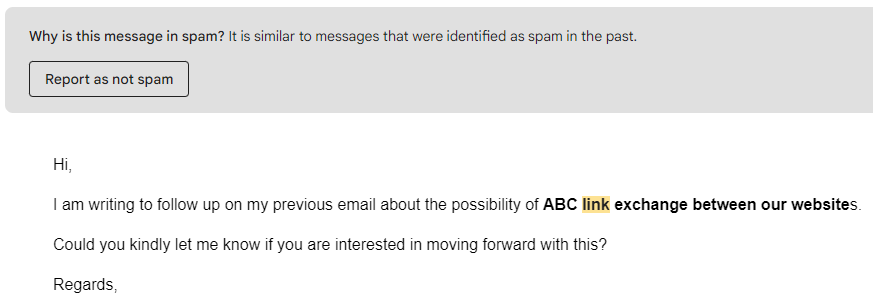
This can happen if you rely excessively on outreach tools, as Debbie Moran, the Marketing Manager at RecurPost, has learned:
While automation tools can save time, relying too heavily on them can make your outreach appear impersonal and spammy. For example, we once used an automation tool to send out hundreds of outreach emails for backlinks. The tool used a standard template and lacked personalization. This resulted in a very low response rate and mixed feedback.
Apart from being a waste of time, sending spammy emails can harm your domain if you're using your domain email.
Here are a few tips on how to avoid it:
- Get to know the recipient and their work.
- Make relevant references to their content.
- Include their name in the subject line and the email body.
To further increase your chances of a successful response, make the email easy to read, get straight to the point, and offer value upfront with no strings attached. For example, link back to their content in your blog and suggest collaboration.
Mistake #13: Not Creating Link-worthy Content
When asked about her biggest link-building mistakes, Paige Arnof-Fenn, the Founder & CEO at Mavens & Moguls, mentioned not creating content that's worth linking to:
For starters content must be genuinely link-worthy. Not all content is created equal, link-worthy content is valuable, informative, unique and engaging so other websites like to reference and link to it because it benefits their audience by solving problems or answering questions.
What are the most linkable assets out there?
- Original research
- Statistic compilations
- Infographics
- In-depth guides
- Interactive resources
- Free tools and calculators
For example, our State of Link Building 2024 report, based on our original research, has earned a few high-quality backlinks from sites like Snov.io, Siege Media, BuzzStream and Stanventures.
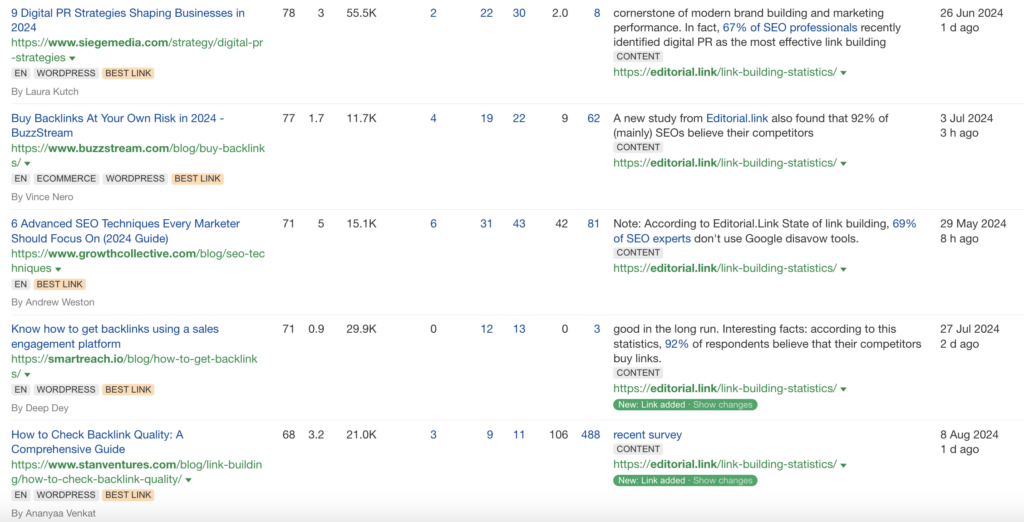
I get it: such research is difficult to conduct, takes time, and isn't cheap, but the investment is worth it because such assets keep generating backlinks organically long into the future.
Mistake #14: Not Monitoring Broken Links
Link rot is real.
Ahrefs data shows that at least 66.5% of links have been lost in the last nine years. That's 7% a year.
Now, imagine you're working with an agency that acquires 100 links for you for $300-1000 a pop. If 7 of them disappear, you could be losing $2100-7000.
Whether they get removed intentionally or disappear as a result of an error, not tracking your links is a costly mistake.
The easiest way to prevent it is by using a link-monitoring tool, like BacklinkManager, Linkody, or Monitor Backlinks. They crawl your links every 24 hours or so and notify you of link status changes. Or, you can use Ahrefs or Semrush to manually inspect your site for broken links.
If a link disappears, get in touch with the website owner or link-building agency and reclaim it.
Mistake #15: Don’t Use Unlinked Brand Mentions
If you're an established brand with an extensive online presence, unlinked brand mentions are easy pickings. If site owners already mention you in their content, all you have to do is ask for the link.
Even if you have to incentivize them to link to your page, for example, by offering free credits or inviting them to the affiliate program, it's much easier to get such a link. There's no need to persuade them you're worth including in their content, and adding the links requires little effort on their part.
Mistake #16: Not Prioritizing Backlink Quality Over Quantity
When I asked SEOs about the most common link-building mistakes, prioritizing backlink quantity over quality was probably the most common one, especially early on in their careers.
When I first started in SEO, I was under the impression that the more backlinks a website had, the better it would perform in search results. So, I spent a lot of time and effort acquiring as many links as possible, without paying much attention to the relevance or authority of the linking sites.
It's true that more backlinks can translate into higher rankings. According to the Internet Marketing Ninjas study, 96% of websites appearing in the top 10 research results on Google have more than 1000 links.
However, link quality always trumps quantity. Don't believe me?
Our article about link-building campaigns ranks in the top spot 3 for a hard keyword (link building campaign, backlink campaign) with just 12 backlinks.
The secret? 5 of them come from reputable sites with DR70+.
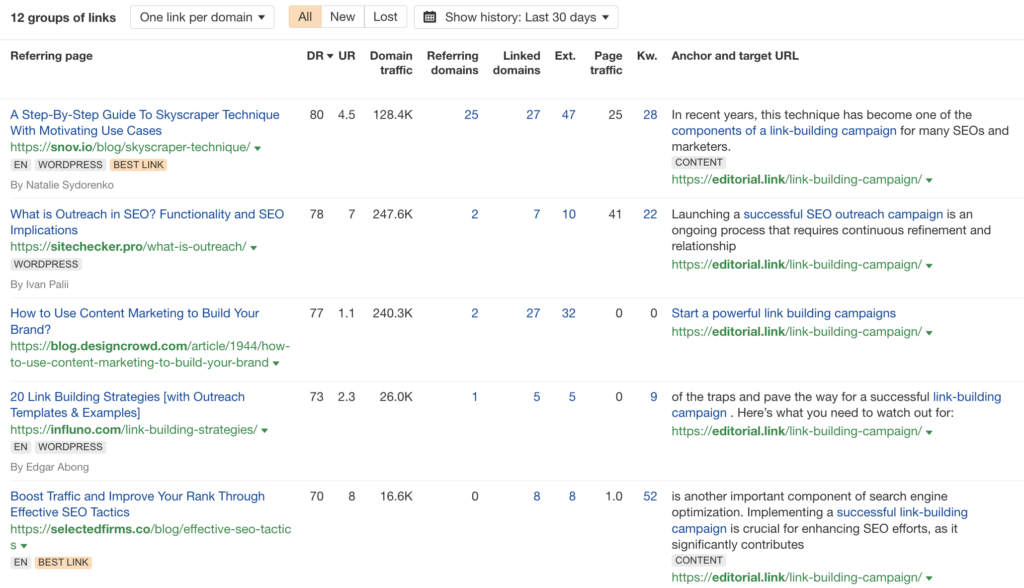
Mistake #17: Chasing the Perfect Link
While backlink quality matters, getting obsessed with 'perfect' backlinks is another big link-building mistake, according to Alex Tereshchenko, the founder of High-Caliber.Link:
A perfect target has three checks: a 100% relevant site and page, a Domain Rating (DR) close to 100, traffic exceeding 1 million, and ideally, it already ranks for your target keywords. While there’s nothing wrong with desiring such links, fixating solely on them is a waste of time.
First, such backlinks are super difficult to get, and a lot depends on luck: "It's like fishing. You can't catch an Atlantic bluefin tuna on your first cast. It takes time, patience (and luck 🤫.)" says Alex.
What's more, a backlinks profile made up exclusively of such links wouldn't look natural. Your competitors aren't likely to have such perfect backlinks profiles and neither should you:
All your top competitors have a natural distribution of links. Their portfolios aren't filled with perfect placements. Your link building strategy should mirror this natural distribution.
Mistake #18: Not Building Relationships
"Websites don't give you backlinks - people do", someone once told me that.
This makes perfect sense. Your outreach email is more likely to get a response if you've previously engaged with the recipient's social media content.
Relationships affect how people make decisions. Especially when it comes to link-building. I strongly believe that mass outreach and “Dear Sir/Madam” messages are over. Link-building has become more competitive. Building relationships is a new way.
Moreover, cultivating relationships with other websites and businesses in your niche can create valuable link-building opportunities, like link or guest post exchanges.
This not only gets you quality links for free but also increases your brand visibility because it gets your content in front of their audiences.
Final Words
Link-building is fraught with potential pitfalls. From buying backlinks to neglecting relationship-building, these 18 mistakes can seriously hinder your SEO efforts and potentially harm your website's reputation and rankings.
The key to successful link-building lies in creating valuable content, fostering genuine relationships, and employing white-hat tactics that align with search engine guidelines. It's about quality and relevance over quantity and playing the long game rather than seeking quick fixes.
If it feels overwhelming or you want to outsource link-building so that you can focus on other high-impact tasks, get in touch with the Editorial.Link team.












